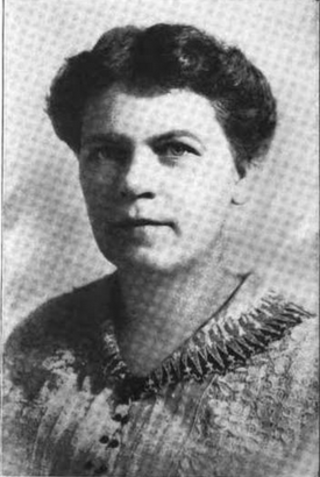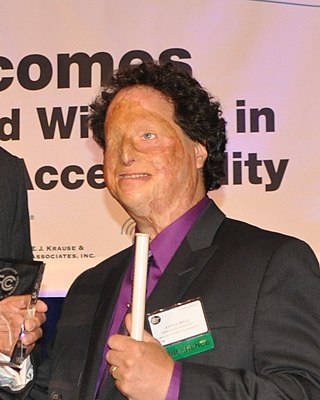Related Research Articles

Helen Adams Keller was an American author, disability rights advocate, political activist and lecturer. Born in West Tuscumbia, Alabama, she lost her sight and her hearing after a bout of illness when she was 19 months old. She then communicated primarily using home signs until the age of seven, when she met her first teacher and life-long companion Anne Sullivan. Sullivan taught Keller language, including reading and writing. After an education at both specialist and mainstream schools, Keller attended Radcliffe College of Harvard University and became the first deafblind person in the United States to earn a Bachelor of Arts degree.

Anne Sullivan Macy was an American teacher best known for being the instructor and lifelong companion of Helen Keller.
Tactile signing is a common means of communication used by people with deafblindness. It is based on a sign language or another system of manual communication.
The American Foundation for the Blind (AFB) is an American non-profit organization for people with vision loss. AFB's objectives include conducting research to advance change, promoting knowledge and understanding, and shaping policies and practices.

The California School for the Blind is a public educational institution for blind children, K-12, located in Fremont, California. Its campus is located next to the California School for the Deaf.

The Story of Esther Costello is a 1957 British drama film starring Joan Crawford and co-starring Rossano Brazzi, and Heather Sears. The film is a story of large-scale fundraising. The Story of Esther Costello was produced by David Miller and Jack Clayton, with Miller directing. The screenplay by Charles Kaufman was based on the 1952 novel by Nicholas Monsarrat. It was distributed by Columbia Pictures.

Christine Huyen Tran Hà is an American chef, writer and TV host. She is the first blind contestant of MasterChef and the winner of its third season in 2012.
Rebecca Ann Alexander is an American psychotherapist and author. Deafblind due to Usher syndrome, Alexander wrote a memoir in 2014 about coming to terms with her deteriorating sight as well as her feats as an extreme athlete, such as climbing to the summit of Mount Kilimanjaro. In 2016, she received a Helen Keller Achievement Award from the American Foundation for the Blind.

Haben Girma is an American disability rights advocate, and the first deafblind graduate of Harvard Law School.

Edith Mansfield Fitzgerald (1877–1940) was a deaf American woman who invented a system for the deaf to learn proper placement of words in the construction of sentences. Her method, which was known as the 'Fitzgerald Key,' was used to teach those with hearing disabilities in three-quarters of the schools in the United States.
Catherine J. Kudlick is an American historian. She is a Professor of History and director of the Paul K. Longmore Institute on Disability at San Francisco State University. She is also an affiliated professor in the Laboratory ICT University Paris VII.

Mary Dranga Campbell, born Mary Ogden Dranga, was an American social worker, active in work on blindness prevention and rehabilitation.

Helen May Martin was an American pianist. Helen Keller called Martin "the most accomplished deaf and blind person in the world."
Alex Bulmer is a Canadian playwright and theatre artist. Bulmer is the co-founder of the theatre companies SNIFF Inc. and Invisible Flash. She wrote the play Smudge and was a writer for the 2009 Channel 4 series Cast Offs.

Angeline Fuller Fischer was an American writer. She is considered one of the earliest deaf feminists due to her advocacy for the equal education of deaf women. Her poems and articles were published in publications across the United States; in 1908 the newspaper The Silent Worker called Fischer "one of America's great deaf poets".

Joshua A. Miele is an American research scientist who specializes in accessible technology design. Since 2019, Miele has been Principal Accessibility Researcher at Amazon Lab126, a subsidiary of Amazon that works on hardware products. Before joining Amazon, Miele conducted research on tactile graphics and auditory displays at the Smith-Kettlewell Eye Research Institute in California for fifteen years. He has been blind since early childhood.

Thomas Stringer was an American carpenter. Deafblind from a young age, Stringer was brought to the Perkins Institution for the Blind through the fundraising of Helen Keller. He was well-regarded at the school for his carpentry skills, which he used to help support himself after graduating from Perkins in 1913.
Kim E. Nielsen is an American historian and author who specializes in disability studies. Since 2012, Nielsen has been a professor of history, disability studies, and women's studies at the University of Toledo. Nielsen originally trained as historian of women and politics, and came to disability history and studies via her discovery of Helen Keller's political life.
Catherine "Kitty" Hoffpauir Fischer is an American deafblind librarian and author. She is the co-author of Orchid of the Bayou: A Deaf Woman Faces Blindness a book about her life published in 2001.
Katherine Sherwood is an American artist living and working in the San Francisco Bay Area, California who is known for paintings that explore disability, feminism, and healing, and for her teaching and disability rights activism at the Department of Art Practice at the University of California, Berkeley.
References
- 1 2 "Georgina Kleege". Gale Literature: Contemporary Authors. November 30, 2007. Retrieved 2019-10-18.
- ↑ "BERKELEY ENGLISH FACULTY". University of California, Berkeley . Retrieved 2019-11-20.
- ↑ Srinivasan, Hari (October 30, 2018). "'Disability is a diversity category': An interview with campus lecturer Georgina Kleege". The Daily Californian . Retrieved 2019-11-19.
- 1 2 SIGHT UNSEEN by Georgina Kleege | Kirkus Reviews.
- ↑ "Berkeley English Georgina Kleege". english.berkeley.edu. Retrieved 2019-11-21.
- ↑ Hendren, Sara (2013-11-06). "The White Cane as Technology". The Atlantic. Retrieved 2019-11-21.
- 1 2 "Berkeley English Faculty Georgina Kleege". University of California, Berkeley . Retrieved 2019-10-25.
- ↑ "Nonfiction Book Review: Sight Unseen by Georgina Kleege". www.publishersweekly.com. March 1999. Retrieved 2019-11-21.
- ↑ Fielder, A. (2000). "Book: Sight Unseen". British Medical Journal . 320 (7226): 66. doi:10.1136/bmj.320.7226.66. PMC 1117342 . PMID 10617553.
- ↑ Kudlick, Catherine. "Sight Unseen: A Review". National Federation of the Blind . Retrieved 2019-10-29.
- ↑ Kleege, Georgina (2006). Blind Rage: Letters to Helen Keller . Gallaudet University Press. ISBN 9781563682957 . Retrieved 2019-10-25.
blind rage kleege.
- ↑ Kleege, Georgina (2007). "Blind Rage: An Open Letter to Helen Keller". Sign Language Studies . 7 (2): 186–194. doi:10.1353/sls.2007.0006. S2CID 143296572.
- ↑ "Georgina Kleege, Brief but Spactacular". PBS . Retrieved 2019-10-25.
- 1 2 Kleege, Georgina (2018). More than meets the eye : what blindness brings to art. New York, NY. ISBN 9780190604356. OCLC 983786265.
{{cite book}}: CS1 maint: location missing publisher (link) - ↑ "Disability Awareness Training". Art Beyond Sight. Retrieved 2019-11-18.
- ↑ "Introduction to Haptic Encounters with Georgina Kleege" . Retrieved 2019-11-18.